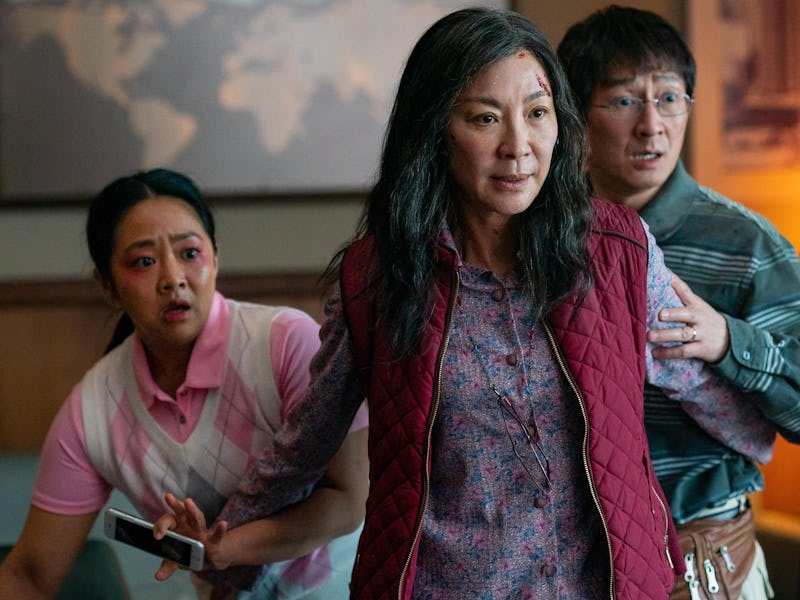Everything Everywhere Changed Oscar History — What Took So Long?
The Oscars may never be the same. No, for real this time.

Last night, on Hollywood’s most prestigious and insular stage, it felt as if the timelines of the multiverse converged in deafening, joyous harmony: Everything Everywhere All At Once made Oscars history, winning not only Best Picture but also taking home the most above-the-line awards in the ceremony’s 95 years.
Despite barreling out of the gate all the way back in March 2022, Daniel Kwan and Daniel Scheinert’s bizarre cocktail of Hong Kong action-cinema, science-fiction maximalism, and existential malaise managed to sustain an electrifying momentum among critics and audiences. From the moment its incredible 11 nominations were announced, the possibility of a sweep hung in the air, and the sheer volume of awards the film took home still feels unbelievable.
Perhaps it’s because the film’s stunning success is a bittersweet testament to the failures of the Academy’s short-sightedness. Everything Everywhere marked Ke Huy Quan’s staggering return to the screen after a 20-year hiatus due to an abysmal lack of opportunity, and he accepted the award for Best Supporting Actor — the third man of Asian descent in 95 years to win in a performance-related category — through tears.
Similarly, Michelle Yeoh made history as not only the first Asian woman to win Best Actress, but as the second woman of color in 20 years, a disparity made crystal clear by Halle Berry’s presence on stage. One can’t help but wonder if Michelle would have had to wait so long to be recognized if the Academy also celebrated the ingenuity of stunt work; far beyond that, though, one can’t help but wonder how in nearly a century, Yeoh and Quan are only the 6th Asian actors to win Oscars, both on the same night for the same film.
Both women in this photo are now Oscar winners.
Of course, Everything Everywhere’s win isn’t simply a reflection of past shortcomings, but an exciting promise of what could be if the Academy widened its lens more often. The film’s narrative essence is like an anathema to the kind of “Oscar-bait” winners that have dominated the ceremony for years, so for it to win Best Original Screenplay is another example of the brilliance to be found in the evocative conventions of genre filmmaking. No one other than the Daniels could have written that script, and their proclivity for head-trip absurdism can be traced as far back as the remarkably bizarre Lil’ Jon music video “Turn Down For What.” Their career has been nothing but bold and bewildering creative swings, and it’s refreshing to see Best Director go to a duo with such an authoritative vision.
It’s easy to look back on other trend-bucking wins in Academy history and be discouraged by the seeming lack of change enacted in their aftermath, but this one feels like such a radical miracle that it’s impossible not to be hopeful. Both Ke Huy Quan and Michelle Yeoh’s historic wins are a reminder that there is unsung brilliance being refined by those who have been historically left out of Hollywood’s spotlight. Everything Everywhere All At Once might have taken home a much-deserved seven statues, but its true victory was in showcasing the power of untold stories, from the breathtaking spectacle of a multiversal odyssey to the quiet intimacy of the relationship between a Chinese-American immigrant and her daughter.
This article was originally published on